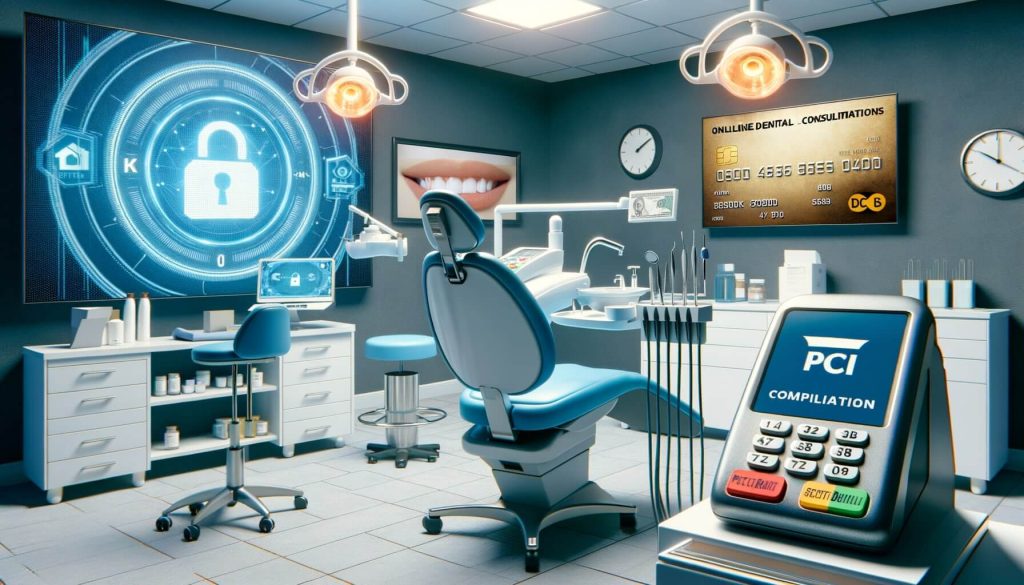In today’s digital age, the healthcare industry has witnessed a significant shift towards online platforms and virtual services. Dental practices, in particular, have embraced the convenience and efficiency of online dental consultations and virtual billing. However, with this transition comes the need for robust security measures to protect sensitive patient data and ensure compliance with industry regulations.
One such regulation that dental practices must adhere to is the Payment Card Industry Data Security Standard (PCI DSS). PCI DSS is a set of security standards designed to protect cardholder data and prevent fraud in payment card transactions. In this article, we will explore the importance of PCI compliance in the dental industry, the key requirements for achieving compliance, best practices for protecting patient data, common challenges and solutions, and the importance of training and education for dental professionals.
Understanding the Importance of PCI Compliance in the Dental Industry
The dental industry handles a vast amount of sensitive patient information, including personal and financial data. With the increasing popularity of online dental consultations and virtual billing, it is crucial for dental practices to prioritize the security of this data. Failure to comply with PCI DSS can result in severe consequences, including financial penalties, reputational damage, and loss of patient trust.
PCI compliance ensures that dental practices have implemented the necessary security measures to protect patient data during online consultations and virtual billing. By adhering to PCI DSS, dental practices can demonstrate their commitment to safeguarding patient information and reducing the risk of data breaches and identity theft.
Key Requirements for Achieving PCI Compliance in Online Dental Consultations

To achieve PCI compliance, dental practices must meet a set of requirements outlined by the PCI Security Standards Council. These requirements are divided into six categories, each addressing different aspects of data security. Let’s explore these requirements in detail:
1. Build and Maintain a Secure Network: Dental practices must install and maintain a firewall configuration to protect cardholder data. They should also change default passwords and security parameters to ensure the integrity of their network.
2. Protect Cardholder Data: Practices must encrypt cardholder data during transmission and storage. This can be achieved by using secure protocols such as Transport Layer Security (TLS) and implementing strong encryption algorithms.
3. Maintain a Vulnerability Management Program: Regularly update and patch systems to protect against known vulnerabilities. Conduct regular vulnerability scans and penetration tests to identify and address any weaknesses in the network.
4. Implement Strong Access Control Measures: Limit access to cardholder data to only authorized personnel. Assign unique IDs to each user and regularly monitor access to ensure compliance with the principle of least privilege.
5. Regularly Monitor and Test Networks: Implement a system for monitoring and logging all access to cardholder data. Regularly test security systems and processes to identify and address any vulnerabilities or weaknesses.
6. Maintain an Information Security Policy: Develop and maintain a comprehensive information security policy that addresses all aspects of data security. This policy should be communicated to all employees and regularly reviewed and updated.
Implementing Secure Payment Processing Systems for Virtual Billing

One of the key aspects of achieving PCI compliance in online dental consultations is implementing secure payment processing systems. Dental practices must ensure that the payment gateway they use is PCI compliant and adheres to the highest security standards.
When selecting a payment processing system, dental practices should look for features such as tokenization and point-to-point encryption (P2PE). Tokenization replaces sensitive cardholder data with a unique identifier, reducing the risk of data theft. P2PE encrypts cardholder data at the point of entry and decrypts it only at the payment processor, minimizing the risk of interception.
Additionally, dental practices should choose a payment processor that offers secure payment methods, such as secure online portals or mobile payment apps. These methods provide an extra layer of security by eliminating the need to store sensitive cardholder data locally.
Best Practices for Protecting Patient Data during Online Dental Consultations

Protecting patient data during online dental consultations is of utmost importance to maintain trust and comply with PCI DSS. Here are some best practices that dental practices should follow:
1. Use Secure Communication Channels: Ensure that all communication channels used for online consultations, such as video conferencing platforms or messaging apps, are secure and encrypted. Avoid using public Wi-Fi networks and encourage patients to use secure connections as well.
2. Obtain Informed Consent: Before conducting an online consultation, obtain informed consent from the patient regarding the use and storage of their personal and medical information. Clearly explain the security measures in place to protect their data.
3. Implement Multi-Factor Authentication: Require patients to authenticate their identity using multiple factors, such as a password and a one-time verification code sent to their mobile device. This adds an extra layer of security and reduces the risk of unauthorized access.
4. Train Staff on Data Security: Provide comprehensive training to all staff members involved in online consultations on data security best practices. This includes educating them on the importance of strong passwords, secure communication, and recognizing phishing attempts.
5. Regularly Update Software and Devices: Keep all software and devices used for online consultations up to date with the latest security patches and updates. Outdated software can be vulnerable to security breaches and malware attacks.
Ensuring Secure Data Transmission and Storage in Virtual Billing Systems

In virtual billing systems, dental practices must ensure the secure transmission and storage of patient data to comply with PCI DSS. Here are some measures that can be taken to achieve this:
1. Use Secure Payment Gateways: Only use payment gateways that are PCI compliant and offer secure transmission of cardholder data. Ensure that the payment gateway encrypts data during transmission and securely stores it.
2. Encrypt Stored Data: Implement strong encryption algorithms to encrypt stored cardholder data. This ensures that even if the data is compromised, it remains unreadable and unusable to unauthorized individuals.
3. Regularly Monitor and Audit Systems: Implement a system for monitoring and auditing all access to cardholder data. Regularly review logs and conduct internal audits to identify any unauthorized access or suspicious activity.
4. Implement Data Retention Policies: Develop and enforce data retention policies that specify the duration for which cardholder data can be stored. Once the data is no longer needed, securely delete or destroy it to minimize the risk of data breaches.
5. Secure Physical Storage: If physical copies of patient data are maintained, ensure that they are stored in a secure location with restricted access. Implement measures such as locked cabinets and surveillance systems to protect against theft or unauthorized access.
Common Challenges and Solutions in Achieving PCI Compliance for Dental Practices
Achieving PCI compliance can be challenging for dental practices, especially those transitioning to online platforms. Some common challenges faced by dental practices and their solutions include:
1. Limited Resources: Dental practices may have limited resources to invest in robust security measures. However, there are cost-effective solutions available, such as cloud-based security services, that can help meet PCI compliance requirements without significant upfront costs.
2. Lack of Technical Expertise: Dental practices may lack the technical expertise required to implement and maintain secure systems. Partnering with a managed security service provider (MSSP) can help bridge this gap by providing expert guidance and support.
3. Third-Party Vendor Compliance: Dental practices often rely on third-party vendors for services such as payment processing or telehealth platforms. It is essential to ensure that these vendors are PCI compliant and have robust security measures in place. Conduct due diligence and regularly review vendor compliance to mitigate risks.
4. Employee Training and Awareness: Lack of employee training and awareness can pose a significant risk to PCI compliance. Regularly train employees on data security best practices, conduct phishing awareness campaigns, and enforce strong password policies to minimize the risk of human error.
Training and Education for Dental Professionals on PCI Compliance
Training and education play a crucial role in ensuring PCI compliance within dental practices. Dental professionals must be aware of the importance of data security and understand their role in protecting patient information. Here are some key aspects of training and education for dental professionals:
1. General Data Security Awareness: Provide comprehensive training on data security best practices, including password hygiene, secure communication, and recognizing phishing attempts. This training should be mandatory for all staff members, including dentists, hygienists, and administrative staff.
2. PCI Compliance Training: Conduct specialized training sessions on PCI compliance, focusing on the specific requirements and best practices for online dental consultations and virtual billing. This training should cover topics such as secure payment processing, data encryption, and secure data storage.
3. Regular Updates and Refreshers: Data security threats and best practices evolve over time. It is essential to provide regular updates and refresher training to dental professionals to ensure they stay up to date with the latest security measures and regulations.
4. Ongoing Monitoring and Auditing: Implement a system for ongoing monitoring and auditing of data security practices within the dental practice. This can include regular assessments, internal audits, and periodic reviews of security policies and procedures.
Frequently Asked Questions
Q1. What is PCI compliance, and why is it important for online dental consultations?
Answer: PCI compliance refers to adhering to the Payment Card Industry Data Security Standard (PCI DSS) to protect cardholder data and prevent fraud in payment card transactions. It is important for online dental consultations to ensure the security of patient data and comply with industry regulations.
Q2. What are the key requirements for achieving PCI compliance in online dental consultations?
Answer: The key requirements for achieving PCI compliance in online dental consultations include building and maintaining a secure network, protecting cardholder data, maintaining a vulnerability management program, implementing strong access control measures, regularly monitoring and testing networks, and maintaining an information security policy.
Q3. How can dental practices ensure secure payment processing for virtual billing?
Answer: Dental practices can ensure secure payment processing for virtual billing by using PCI-compliant payment gateways, implementing tokenization and point-to-point encryption, and offering secure payment methods such as online portals or mobile payment apps.
Q4. What are some best practices for protecting patient data during online dental consultations?
Answer: Some best practices for protecting patient data during online dental consultations include using secure communication channels, obtaining informed consent, implementing multi-factor authentication, training staff on data security, and regularly updating software and devices.
Q5. How can dental practices ensure secure data transmission and storage in virtual billing systems?
Answer: Dental practices can ensure secure data transmission and storage in virtual billing systems by using secure payment gateways, encrypting stored data, regularly monitoring and auditing systems, implementing data retention policies, and securing physical storage.
Conclusion
PCI compliance is of utmost importance for dental practices engaging in online dental consultations and virtual billing. By adhering to the Payment Card Industry Data Security Standard (PCI DSS), dental practices can protect sensitive patient data, reduce the risk of data breaches, and ensure compliance with industry regulations.
To achieve PCI compliance, dental practices must implement secure payment processing systems, follow best practices for protecting patient data, ensure secure data transmission and storage, and address common challenges through training and education. By prioritizing data security and investing in robust security measures, dental practices can build trust with patients and safeguard their sensitive information.
